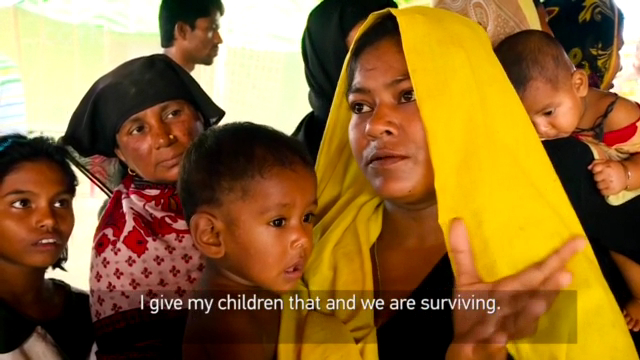
19:53, 29-Dec-2018
Rohingya Crisis: Refugees escape from Myanmar to sue for life
Updated
18:56, 01-Jan-2019
04:31

It's one of the worst humanitarian crises the world has ever seen. Hundreds of thousands of Rohingya refugees made their way to Bangladesh from Myanmar on rickety boats, in a desperate attempt to stay alive. Many died during the perilous journey. CGTN's Shweta Bajaj recounts the horrific ordeal of the Rohingyas and their constant anxiety over their future.
Mumtaz Begum lost three of her children to the violence in Myanmar's Rakhine state. She and her only surviving child – this 6-year-old girl – managed to escape after the military left them for dead.
MUMTAZ BEGUM ROHINGYA REFUGEE "I was unsuccessful in saving them and couldn't bring them with me. They killed my children. I have nothing left."
Mumtaz was among more than half a million people who fled a military offensive in Myanmar in August 2017. She ended up at this camp in Bangladesh, home to hundreds of thousands of Rohingya, many of them refugees from Myanmar. The refugees' ordeal was prompted by an attack on a police outpost by members of the Arakan Rohingya Salvation Army that killed 12 officers. Myanmar considers the group a terrorist organization. The UN has condemned the military's response, calling the offensive a textbook example of ethnic cleansing. It's a charge Myanmar strongly denies. Myanmar's government said the military was not targeting civilians but fighting terrorists in Rakhine.
AUNG SAN SUU KYI MYANMAR STATE COUNSELLOR "We don't want to hurt those who are innocent, but at the same time, we have to make sure that terrorists are not allowed to carry on with their activities."
SHWETA BAJAJ COX'S BAZAR, BANGLADESH "There were an estimated 1 million Rohingyas living in Myanmar before 2017. But because of the planned military offensive women, children and the elderly were forced to leave their homes with whatever little they could gather, cover distances of days by land and water to reach Cox's Bazar in Bangladesh. Out of those 1 million, nearly 700,000 are in these refugee camps in Cox's Bazar in Bangladesh."
The UN High Commission for Refugees says 14 percent of refugees are single mothers who lost their husbands to the violence. One of them is Noorasha Begum who believes her husband was arrested by the military, forcing her to singlehandedly take care of all her four children.
NOORASHA BEGUM ROHINGYA REFUGEE "We are not getting enough aid. I spend my day getting medicines for my children and we are getting some ration. I give my children that and we are surviving."
Among the refugees, women suffered some of the most traumatic experiences. 18-year-old Sahera Khatun says she was raped when she was 6 months pregnant.
SAHERA KHATUN ROHINGYA REFUGEE "We girls were raped inside a room in groups. Our gold and silver ornaments were also taken by the military. There were 20 girls with me. All were raped."
Even though Myanmar and Bangladesh have worked out a repatriation agreement, most Rohingyas refuse to return to Myanmar, saying they fear for their safety. The UN Refugee Agency said the Rohingyas should be allowed to visit Rakhine to assess the safety situation before repatriation. It argued that the responsibility for creating conditions conducive for the refugees' voluntary return lies with Myanmar. But for countless Rohingyas like Mumtaz Begum, whose lives had already been turned upside down, continues to remain a distant and elusive dream.
For CGTN, Shweta Bajaj, in Cox's Bazar, Bangladesh.

SITEMAP
Copyright © 2018 CGTN. Beijing ICP prepared NO.16065310-3
Copyright © 2018 CGTN. Beijing ICP prepared NO.16065310-3